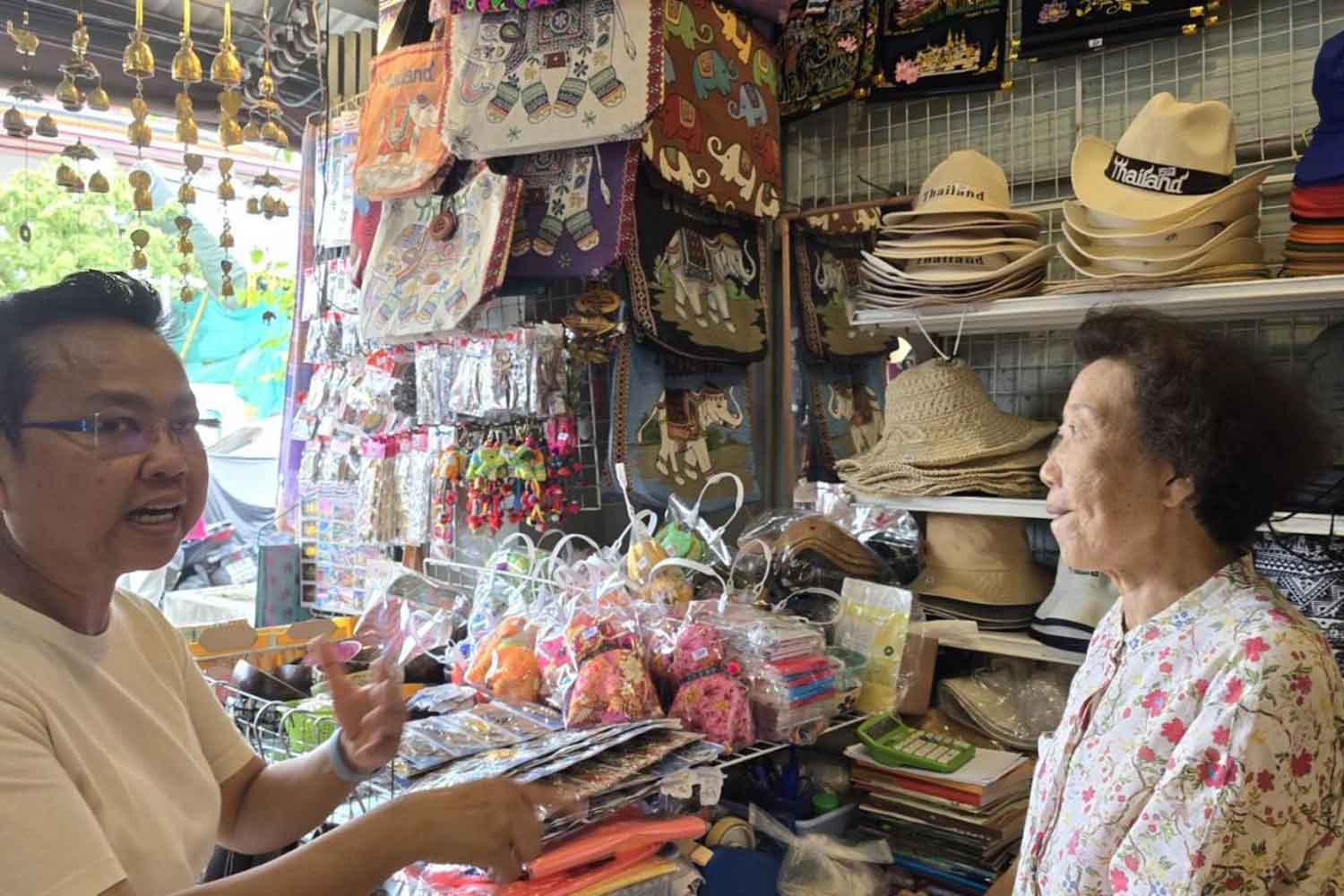The Wat Pho area in Bangkok, famed for its temple complex and vibrant market, is contending with an economic slowdown that is tightening margins for retailers, especially souvenir shops that rely on international visitors. In a recent market survey accompanied by discussions with vendors and shop operators in the Wat Pho neighborhood, local authorities highlighted the breadth of pressure facing the district’s commercial core. The discussions underscored the urgent need for government intervention to stimulate consumer spending and to address the growing presence of cheap, substandard imports that are passing as Thai-made goods. This set of concerns frames a broader conversation about protecting the reputation and long-term appeal of Thai products in a competitive tourism economy.
Economic Slowdown and the Wat Pho Commercial Area
The market survey and subsequent talks with stakeholders in the Wat Pho neighborhood revealed that the economic slowdown poses significant challenges for the commercial area, with particular impact on souvenir retailers and related small businesses. Auramon Supthaweethum, the director-general of the Department of Business Development (DBD), articulated the crux of the issue: while Wat Pho remains a top draw for visitors, the slowdown dampens consumer confidence and discretionary spending, especially in sectors that cater to tourists seeking affordable keepsakes. The operators stressed that most visitors to the area now gravitate toward high-quality Thai items they can proudly take home, reflecting a shift in tourist expectations that places greater emphasis on authenticity and value. The presence of low-priced, substandard imported goods that are mixed with authentic Thai products creates a risky dynamic. Tourists may purchase inferior items inadvertently, assuming they are authentic Thai goods, thereby risking the overall image and perceived value of Thai products in the market.
This situation is not merely about price competition; it raises questions about consumer trust and brand integrity. Operators cautioned that when substandard imports are misrepresented as Thai-made, it undermines the market’s credibility and can erode foreign visitors’ willingness to invest in genuine Thai products in the long term. The resulting reputational risk has tangible consequences for the Wat Pho commercial corridor, which relies heavily on the flow of international tourists seeking memorable purchases that symbolize Thai culture and craftsmanship. The operators urged decisive government action to boost spending power in the broader economy, while simultaneously curbing the proliferation of cheap imports that distort consumer choice and tarnish the reputation of Thai craftsmanship.
In practical terms, the operators argued that restoring confidence among visitors requires a two-pronged approach: stimulating immediate demand through targeted economic measures and safeguarding product integrity through tighter controls on labeling and origin claims for goods sold in the area. The overarching goal, according to the operators and Auramon, is to preserve the long-term competitiveness of Thai products by ensuring that what tourists buy from Wat Pho accurately reflects Thai quality and value. Protecting the integrity of Thai products is seen as essential for the sustainability of the Wat Pho commercial neighborhood and for the continued success of local vendors who depend on consistent tourist footfall and expenditure. The DBD’s response would need to reflect these dual priorities: short-term stimulus to revitalize spending and longer-term strategies to strengthen product authenticity and consumer trust.
Tourist Perception, Product Quality, and Branding
Tourists who visit Wat Pho are frequently drawn to items that embody Thai heritage and craftsmanship. The discussions underscored a consistent demand among travelers for high-quality Thai products that they can regard as authentic and representative of the country’s culture. Yet, the market environment has seen a troubling mix of low-priced imports that may be misrepresented as Thai-made, creating confusion and the potential for visitor dissatisfaction. The risk is not merely about counterfeit prices; it concerns the broader branding of Thai goods and the perceived value of souvenirs. When shoppers encounter items that do not meet expected quality standards, even if they are inexpensive, there is a lasting risk of negative word-of-mouth and reduced willingness to pay for authentic Thai products in the future.
This tension between affordability and authenticity is at the heart of the operators’ concerns. They emphasized that tourists who do purchase items that they believe are genuine Thai products expect a certain standard of quality, materials, and craftsmanship. When those expectations are unmet due to substandard imports, the resulting disappointment can undermine the desirability of Wat Pho’s shopping experiences and its reputation as a hub for genuine Thai goods. To safeguard the authenticity narrative, business operators advocate for clear differentiation between authentic Thai products and lower-cost imports, paired with transparent labeling practices and robust enforcement that prevents misrepresentation. The DBD’s planned approach would therefore need to address not only consumer demand signals but also the structural integrity of the product landscape in the Wat Pho area.
In parallel with quality concerns, there is recognition that the tourism economy is highly sensitive to macroeconomic conditions and exchange-rate dynamics. The downturn in purchasing power among local consumers, coupled with softer foreign tourist arrivals or spending, can compress profit margins for souvenir operators who already operate with tight margins. In this context, the stakeholders called for policies that can quickly boost domestic consumption while maintaining the appeal of Wat Pho as a premier destination for Thai-crafted goods. The goal is a balanced ecosystem in which visitors can reliably find high-quality Thai souvenirs, while local vendors can sustain their businesses amid evolving market conditions. The DBD’s leadership acknowledged these dynamics and signaled that the department would tailor its support measures to address both the perception gap around product authenticity and the demand-side pressures driven by the current economic climate.
Government Action: Short-Term Stimulus and Long-Term Stability
Business leaders in Wat Pho are pressing the government to implement immediate measures that can stimulate purchasing power and generate quick cash flow. Among the proposals under consideration is the reintroduction of co-payment schemes designed to inject money directly into the economy and stimulate consumer activity. In particular, the sector sees potential benefits from revived programs that encourage spending among households, thereby sustaining local businesses across retail and hospitality services. The emphasis is on short-term interventions that can translate into immediate sales momentum for souvenir shops and related outlets.
Beyond immediate stimulus, stakeholders are seeking rapid policy actions aimed at anchoring medium- and long-term economic stability. They want a more predictable investment climate that encourages both domestic and foreign investment, alongside reforms that improve the ease of doing business in the Wat Pho district. The sense among business leaders is that policy clarity and timely execution are crucial to sustaining confidence in the sector. In addition to macroeconomic measures, there is a focus on targeted initiatives that address the specific challenges faced by the Wat Pho commercial corridor, including improved enforcement of product labeling and origin claims to combat the misrepresentation of imported goods as Thai-made.
The operators also stressed the importance of a cooperative approach with delivery platforms to create a more favorable operating environment. Although delivery platforms can expand sales opportunities by linking vendors with broader customer bases, they can also impose significant cost pressures. In many cases, operators report that delivery partners demand a sizeable share of revenue, which compounds existing cost pressures and reduces net profits. As a result, the sector is seeking a policy framework that fosters constructive collaboration with delivery platforms. Possible measures include fee reductions, promotional mechanisms, or other arrangements that can help vendors increase sales while reducing the financial burden of platform commissions.
In this context, there is a call for the government to implement targeted, results-oriented actions that directly support Wat Pho’s businesses. The DBD would develop strategies that reflect the unique needs of the neighborhood, with a focus on helping souvenir operators protect brand integrity, maintain quality standards, and compete effectively in an environment shaped by both domestic demand and international tourist spending. The overarching aim is to sustain the Wat Pho commercial ecosystem by aligning policy levers with the realities of today’s tourism-driven economy and the evolving expectations of visitors seeking authentic Thai goods.
Short-Term Strategies Under Consideration
- Reintroduce or adapt consumer stimulation programs, such as co-payment schemes, to boost spending power among households and travelers.
- Implement rapid policy actions that deliver immediate cash flow support to retailers and small businesses in the Wat Pho area.
- Facilitate partnerships with online and delivery platforms to reduce upfront costs and improve promotional opportunities for local vendors.
- Strengthen labeling and origin verification to prevent the misrepresentation of imported goods as Thai-made.
Medium- and Long-Term Stability Measures
- Create a clearer, more predictable investment climate that supports sustainable growth for Wat Pho’s commercial sector.
- Invest in branding and marketing campaigns that emphasize authentic Thai craftsmanship and the unique value proposition of Wat Pho souvenirs.
- Develop training and quality-control programs to raise product standards across the area and protect Thai product integrity.
- Establish ongoing dialogue with platform operators to ensure fair fee structures and mutually beneficial promotional initiatives.
The DBD, represented by Auramon, indicated that the department would, in turn, develop targeted support strategies grounded in the realities shared during the discussions. These strategies would be designed to address the specific obstacles faced by Wat Pho vendors, ensuring that interventions are practical, timely, and well-aligned with the broader economic objectives of Thailand’s tourism and retail sectors. The emphasis is on actionable measures that can deliver tangible benefits for small businesses while preserving the integrity and appeal of Thai products in a highly competitive marketplace.
Challenges in the Restaurant Sector and the Role of Delivery Platforms
The business operators, including Wasun Eua-amnuaychai, chief executive of Hia Lek Chinese Soup Moo Sam Yang Co, a restaurant franchiser, emphasized that the economic environment has caused notable hardships. The challenges span multiple dimensions, including a marked decline in purchasing power, reduced cash flow, and a broader downturn in overall business performance. In addition to these macroeconomic pressures, rising production costs—particularly for restaurants that rely on fresh ingredients daily—have further squeezed margins. The combination of softer demand and higher input costs has created a precarious operating environment for food-service operators in the Wat Pho vicinity.
A further complication arises from the role of delivery platforms. While these platforms can unlock new sales channels and expand customer reach, operators face a complex set of financial pressures. A recurring concern is the significant commission or revenue-sharing demands imposed by delivery services, which can consume a substantial portion of a vendor’s income—some reports indicate more than 30 percent of earnings. This cost burden challenges the viability of smaller, independently owned eateries and souvenir shops that depend on efficient cash flows to cover daily operating expenses, including rent, utilities, and ingredient purchases. The operators argued for a more balanced approach to platform partnerships that preserves channel benefits while mitigating the associated costs.
Against this backdrop, business operators advocate for short-term government strategies that can quickly bolster purchasing power and cash flow. They highlighted the reintroduction of co-payment-style programs as a practical tool to inject money into the economy and stimulate consumer spending in food-service and retail segments. The objective is to create immediate relief that eases day-to-day financial pressures and stabilizes business performance in the near term. At the same time, operators emphasized the need for rapid policy actions that promote medium- and long-term economic resilience. A stable investment climate and continued confidence in the local economy are essential for sustained growth, particularly in a district as dependent on tourism and consumer spending as Wat Pho.
Additionally, there is a call for improved collaboration with delivery platforms to reduce platform fees or introduce targeted promotions that support businesses. Such measures could help increase sales volumes while easing the cost pressures on restaurant operators and retailers alike. The aim is to secure a more favorable operating environment that allows Wat Pho-based businesses to compete effectively, maintain profitability, and preserve the quality and integrity of Thai offerings.
Auramon stated that the DBD would develop targeted support strategies for the businesses based on the challenges highlighted during the discussions. The department’s approach would seek to address the immediate cash-flow concerns and the longer-term structural challenges faced by restaurant operators and other vendors in the Wat Pho area. By aligning support with the unique needs of the district, the DBD aims to deliver practical assistance that supports business survival and growth while reinforcing the reputation of Thai products and hospitality services in Bangkok’s historic core.
Sectoral Insights and Stakeholder Collaboration
The conversations with business owners and the DBD leadership reveal a shared recognition of the need for a coordinated, cross-sector response. Operators across the Wat Pho district are calling for a collaborative framework that fosters alignment between government policy, the tourism sector, retail craft producers, and digital platforms. Such collaboration is seen as essential to creating a resilient economic environment that can withstand cyclical downturns and evolving consumer preferences. The common thread across stakeholders is a commitment to protecting Thai product integrity and ensuring Wat Pho remains a premier destination not only for religious and cultural experiences but also for authentic Thai shopping experiences that resonate with visitors.
Stakeholders also stress the importance of communication and transparency. Clear information about regulatory requirements, origin verification, labeling standards, and promotional guidelines will empower vendors to comply effectively and reassure tourists about the authenticity of the goods they purchase. In addition, an ongoing dialogue between the DBD, local business associations, and platform operators can help tailor policies to real-world conditions and adjust quickly to shifts in consumer demand or tourist visitation patterns. The aim is to create a dynamic policy environment that supports small businesses while maintaining rigorous standards for product authenticity and quality.
The Wat Pho business community also underscored the value of marketing and storytelling as a means to differentiate Thai-made products. By highlighting the craftsmanship, cultural significance, and regional distinctiveness of items sold in Wat Pho, vendors can enhance perceived value and justify continued consumer spending even in a slower economy. The DBD’s role in developing targeted support strategies would likely include coordination with marketing efforts, branding initiatives, and capacity-building programs for artisans and suppliers. The long-term objective is to build a robust ecosystem where authentic Thai goods are consistently presented with integrity, ensuring the district remains an attractive and credible shopping destination for both domestic and international visitors.
DBD’s Targeted Support Plans and Implementation
Auramon and her team indicated that the DBD would translate the feedback from discussions into targeted support measures tailored to the Wat Pho businesses’ specific needs. The emphasis would be on designing assistance programs that address both immediate pain points and longer-range capacity-building goals. This approach would involve a careful assessment of the most impactful interventions, such as subsidies or tax relief for small retailers and suppliers, technical support for compliance with labeling and origin standards, and potential pilot initiatives with delivery platforms to improve terms and promote local vendors.
A critical component of the DBD’s plan would be to align these targeted supports with the broader economic objectives for Bangkok and Thailand as a whole. By focusing on the Wat Pho district, the department would test policy instruments that could later be scaled to other tourism-rich neighborhoods facing similar pressures. The strategy would likely include performance indicators to monitor outcomes, such as changes in tourist spend per visit, improvements in product authenticity verification, and reductions in platform-related cost burdens for small businesses. The department would also leverage stakeholder input to adjust programs as needed, ensuring they remain effective in a rapidly changing market environment.
In practice, the targeted strategies would be designed to help vendors maintain operational viability during periods of slow growth while reinforcing the appeal of Thai products. The DBD’s involvement would extend to facilitating access to funding or financing options, supporting training on quality standards and branding, and collaborating with other government agencies to implement complementary measures. The ultimate objective is to foster a sustainable, thriving Wat Pho commercial ecosystem where authentic Thai crafts and culinary experiences flourish, generating lasting value for local entrepreneurs and the nation’s brand.
Conclusion
The Wat Pho commercial district stands at a crossroads as Thailand navigates an economic slowdown that strains souvenir retailers, restaurants, and related businesses. Market surveys and dialogues with vendors, led by Auramon Supthaweethum of the Department of Business Development, underscore the urgency of action: to spur consumer spending, curb the influx of cheap, substandard imports, and safeguard the integrity of Thai products. Tourists’ demand for high-quality Thai items, paired with the reputational risks posed by substandard goods, makes preserving authenticity a top priority for the Wat Pho market. The sector’s leaders emphasize the need for coordinated government intervention that delivers immediate stimulus and sets the stage for long-term stability, including a friendlier investment climate and smarter collaborations with delivery platforms.
Wasun Eua-amnuaychai and other operators have articulated a comprehensive set of needs, ranging from improved purchasing power and cash flow to mitigated costs from platform commissions and enhanced access to cost-effective promotions. The call for reintroducing co-payment-style programs and implementing rapid policy actions reflects a pragmatic approach to securing near-term relief, while simultaneously pursuing medium- and long-term reforms that will sustain growth and competitiveness. By developing targeted, market-responsive strategies, the DBD aims to tailor support to the Wat Pho businesses’ unique challenges, ensuring that authentic Thai products retain their premium standing and that Bangkok’s historic core remains a vibrant hub for culture, commerce, and craftsmanship. The path forward rests on a balanced blend of immediate stimulus, strengthened product integrity, strategic partnerships with delivery platforms, and a conducive investment climate that can carry Wat Pho—and Thailand’s broader tourism economy—toward sustainable prosperity.



